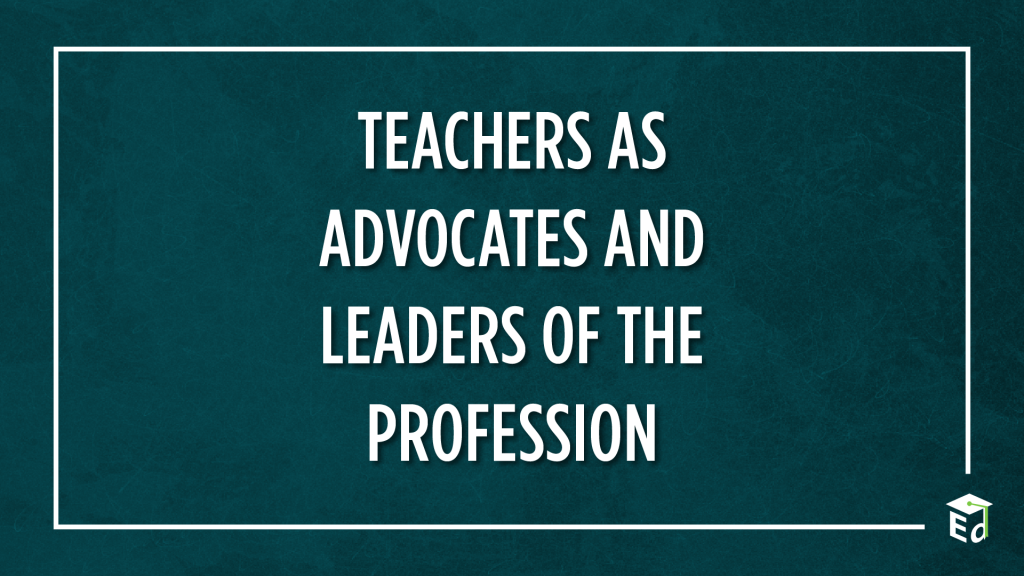
Teachers as Advocates and Leaders of the Profession – ED.gov Blog

By: Lauren Jewett, NBCT (Special Education Teacher/New Orleans, LA)
My mother grew up as one of nine children. Her youngest sibling, my aunt Cheryl, was born with Down Syndrome. At the time of Cheryl’s birth in 1962, the doctors told my grandparents that Cheryl would only live until the age of three, and as such, the family should consider putting her into an institution. My grandparents adamantly refused this recommendation, and Cheryl continued to live at home. My aunt Cheryl passed away in November 2021, just a few months before her 60th birthday. She was deeply cared for and loved by my family until her last day on Earth.
The strong support and nurturing environment that my aunt had throughout her life is a testament to the power of advocacy and what can happen when someone lives in daily proximity to it. This approach to advocacy is one that I take in my own career. After graduating from college, I accepted a role teaching special education in New Orleans. Three years later, I began working at a school where I was responsible for leading and coordinating all special education services. Due to a lack of trained and certified special education teachers at the school, I also taught students with IEPs, and because the school did not have a full-time social worker or counselor, I also coordinated student mental health services. While I did not have a deep understanding of larger systemic failures in my school’s community at the time, I knew there was something deeply unsettling and unjust about its lack of resources.
I recall one conversation with my school leader in the under-utilized library/storage room at our post-Katrina FEMA modular campus. He told me that we would not solve the academic problems or needs of our school with a social work approach. Just like my grandparents were unwilling to accept the doctor’s recommendations about my aunt, I was unwilling to accept my school leader’s rationale that whole-child approaches and social work had no place in a child’s developmental and academic success. This conversation activated a dormant advocacy that was brewing inside of me; one that was committed to ensuring that people’s humanity and dignity are always at the heart of choices and decisions. Before leaving at the end of the school year, I advocated with other concerned staff members to guarantee that on-site mental health providers were hired for the following school year.
Part of being a teacher leader means being an advocate, and using our professional expertise to impact transformative change. Here are seven tips for teachers to engage in advocacy work:
- Know, practice, and refine your story: Part of being a teacher leader and advocate is sharing your story, especially with those who can enact policy changes. Our stories are what bind us, and they have the capacity to change hearts and minds.
- Identify your passions and network with those who share them: Know your unique education passions and interests, cultivate them, and become an expert. Network with or become members of organizations connected to your passions and use those connections as springboards to dive deeper into advocacy work.
- Research and stay up-to-date on education policies and legislation: This will help you become well-versed in trends and statistics, and knowledgeable about the ways policies and legislation affect you, your colleagues, and your students. It is also important to understand how you can work with your representatives on bills pertaining to education.
- Attend meetings about education issues: Most meetings about education that affect teachers’ day-to-day realities will be local or state school board meetings, state legislative committee meetings or hearings, or local community meetings. Educators can also engage in focus groups, town halls, district or superintendent advisory councils, and standards/curriculum committees. Within school buildings, teachers can also advocate as members of their grade level teams, IEP teams, RtI and MTSS teams, interdisciplinary teams, and subject/content area teams.
- Identify and keep in contact with elected officials and decision-makers: Organizing meetings, writing letters, and engaging directly on social media are all concrete ways to demonstrate to policymakers that you know and care about education.
- Vote: Vote in every election, not just every four years during the presidential cycle. Many important decisions around education are made by candidates running for local, municipal, and state offices. When you go to the polls to cast your vote, make sure you have done your homework about the issues and candidates on the ballot.
- Write op-eds, blogs, and articles: Writing op-eds for the local newspaper and contributing to education blogs helps ensure that teachers’ voices and perspectives are heard.
It has been said that those closest to the pain should be closest to the power. Teachers are in their classrooms every day, experiencing the painful and beautiful realities of policies that are far too often made without their input. Advocacy is one salve for the policy implementation gap. By advocating, teachers ensure that they are putting themselves in proximity to power and bringing their stories of joy and pain to the policy-making spaces and decision-making tables.
Stay connected with us on social media platform for instant update click here to join our Twitter, & Facebook
We are now on Telegram. Click here to join our channel (@TechiUpdate) and stay updated with the latest Technology headlines.
For all the latest Education News Click Here
For the latest news and updates, follow us on Google News.

